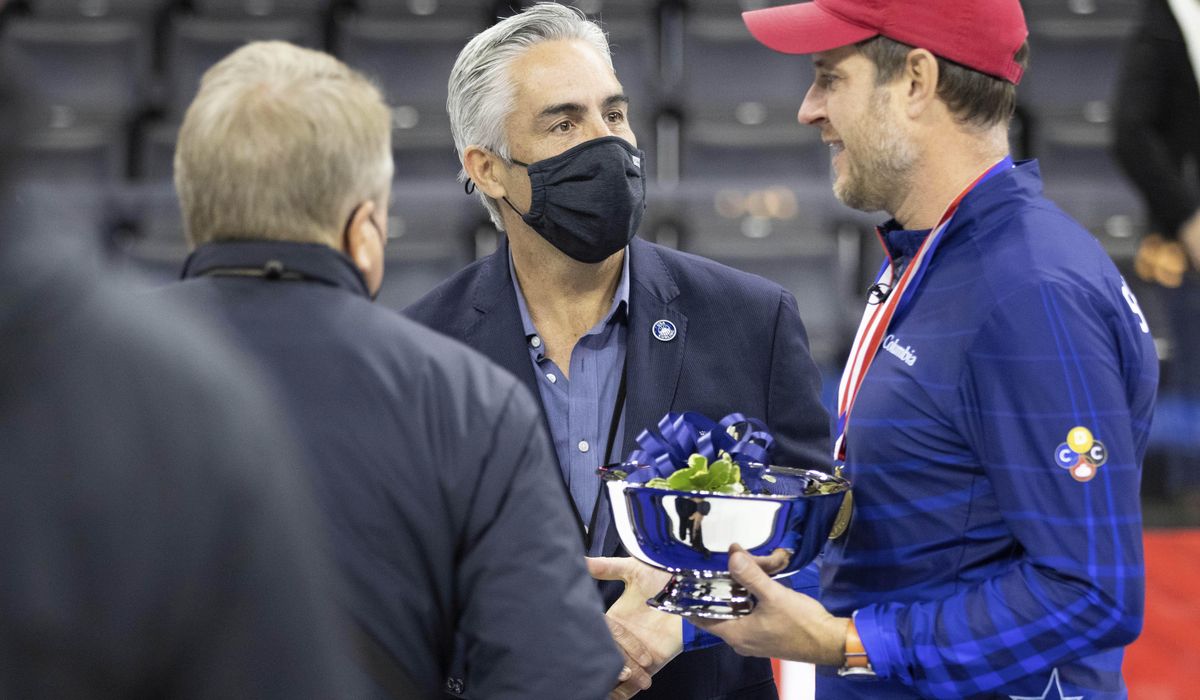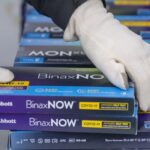
Curling, among the “nichiest” of niche sports in the United States, took its place in the national spotlight after the American men won the gold medal at the Pyeongchang Olympics in 2018.
USA Curling chief executive Jeff Plush was hired two years ago to build off the momentum and develop a program that will move the sport closer to the forefront and make appearances on the medal stand an expectation rather than a pleasant surprise.
The John Shuster-skipped team that upset Sweden in 2018 will be in Beijing next month to play for another gold. Joining him are returnees Matt Hamilton and John Landsteiner and newcomer Chris Plys.
The women’s skip is Tabitha Peterson, who plays with Nina Roth, Becca Hamilton and Tara Peterson. The U.S. women are looking for their first medal since the sport was added to the Olympic program in 1998. Plys and Vicky Persinger will compete in mixed doubles.
Prior to joining USA Curling, the 55-year-old Plush was an executive in professional soccer and a sports agent.
He oversaw the 2021 move of USA Curling’s longtime headquarters in Stevens Point, Wisconsin, to Eagan, Minnesota, where world-class curlers have access to up-to-date facilities on a campus shared with the Minnesota Vikings.
Plush is working to increase funding and land new sponsorships while also tending to the sport at the grassroots level – there are 25,000 curlers among 197 clubs – and encouraging efforts to diversify curling.
Plush sat down with The Associated Press for a 45-minute interview (remarks have been edited for clarity and length).
AP: Did you know much about curling when you when you were hired?
PLUSH: Very, very little – probably as much as the average fan who watches every four years. You learn pretty quick how kind of endlessly complex it is. These players at the elite level, they’ve got over 150 feet of ice, and it’s a margin of inches between winning and losing.
AP: Did the 2018 Olympic gold medal raise the bar for the sport in America?
PLUSH: Well, it should, and it needs to. I don’t think you run away from that. When you have success, you earn the right to demand more of yourself. We have to applaud what happened in 2018 and realize that that is over and we have to go and try to achieve these things every year whether it’s a world championship, whether it’s men or women, Paralympics.
AP: Is the U.S. men’s program ahead of the women’s?
PLUSH: I think you’d have to say it kind of is. I think we have a lot more we can do with the women’s program. I’m not sure that it was as much of a focus as it needed to be. I think we owe it to the women’s program to (put) more time and effort into it. And I think we’ll be rewarded for doing it because we’ve got great young women coming through the pipeline.
AP: What has USA Curling done to put some more emphasis on the women’s program?
PLUSH: When I came into the program, we had three men’s funded teams and only two for women. So just from gender equity, an equal number of team dollars going into programs. It’s not just about money, it’s about our ethos, right? I was excited to do that right away. I think it’ll will bear fruit.
AP: How difficult is it financially for curlers to train and be developed to compete at the world level?
PLUSH: It’s still very tough. They all have other jobs. There is not nearly enough money in the ecosystem yet. And that’s part of my mission, to change that.
AP: Are more young athletes focusing on curling?
PLUSH: There’s no question the talent level is increasing. We’re continuing to invest in the development both at the elite level and grassroots level. Whether it’s for psychology, nutrition or our (athletic) trainer, we’ve extended that now down to our juniors.
AP: Is there room to grow beyond the 25,000 curling club members?
PLUSH: Demand is there. We have really great, very well-run clubs in major markets like Boston or Detroit or Chicago. They don’t have capacity. They can’t get any bigger. They’ve got waiting lists.
AP: So building more curling facilities is a priority?
PLUSH: I feel very strongly about that and I think that’s a challenge as a nonprofit. We don’t have the capacity to deliver it ourselves. So finding people who can share our vision and bring our assets to the table.
AP: Have there been efforts by USA Curling to enhance diversity?
PLUSH: Absolutely. We’ve launched a program called Icebreakers. We’ve piloted it in about 15 clubs. It’s about getting stones and brooms in the hands of people of color, people from more of an urban marketplace, less privileged backgrounds, It’s been a sport that’s been largely white, largely through country club backgrounds to some degree as well. So I feel very strongly that our sport can be a great sport for people of all backgrounds.
AP: Is it like an after-school program?
PLUSH: Absolutely. It doesn’t have to be on ice, so we could take our street curling kits into YMCAs, Boys and Girls Clubs. Every school district is suffering from budget cuts. Every school district sees value in after-school programming. I think our sport is really well-suited to do that and pretty inexpensive in the grand scheme of things.
AP: When you were hired, was there an edict that USA Curling needed to modernize?
PLUSH: There wasn’t the edict. I think there’s just the understanding that there was more opportunity. I think that’s probably part of why I got the job. I take an approach that’s very ambitious. Not only should we be a very significant sport in the United States, we should be the best curling nation in the world. It doesn’t just happen, right? You have to do a lot of hard work to push yourself and realize the rest of the world is going to be pushing themselves, too.
AP: Will you not be satisfied until there are Americans on the Olympic stand medal stand every four years?
PLUSH: Oh, I don’t think you can expect that. I won’t be satisfied if we’re not maximizing our potential every day. I feel really good if we’re treating our athletes in a way they feel valued, if we’re treating my staff with a culture where they feel supported and pushed, and if our board has pride in what we’re doing for our communities of color. It’s about doing things the right way and making a program the American people can be really proud of. If you do those things, we’re going to win.




